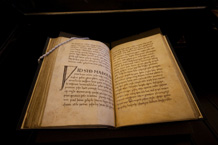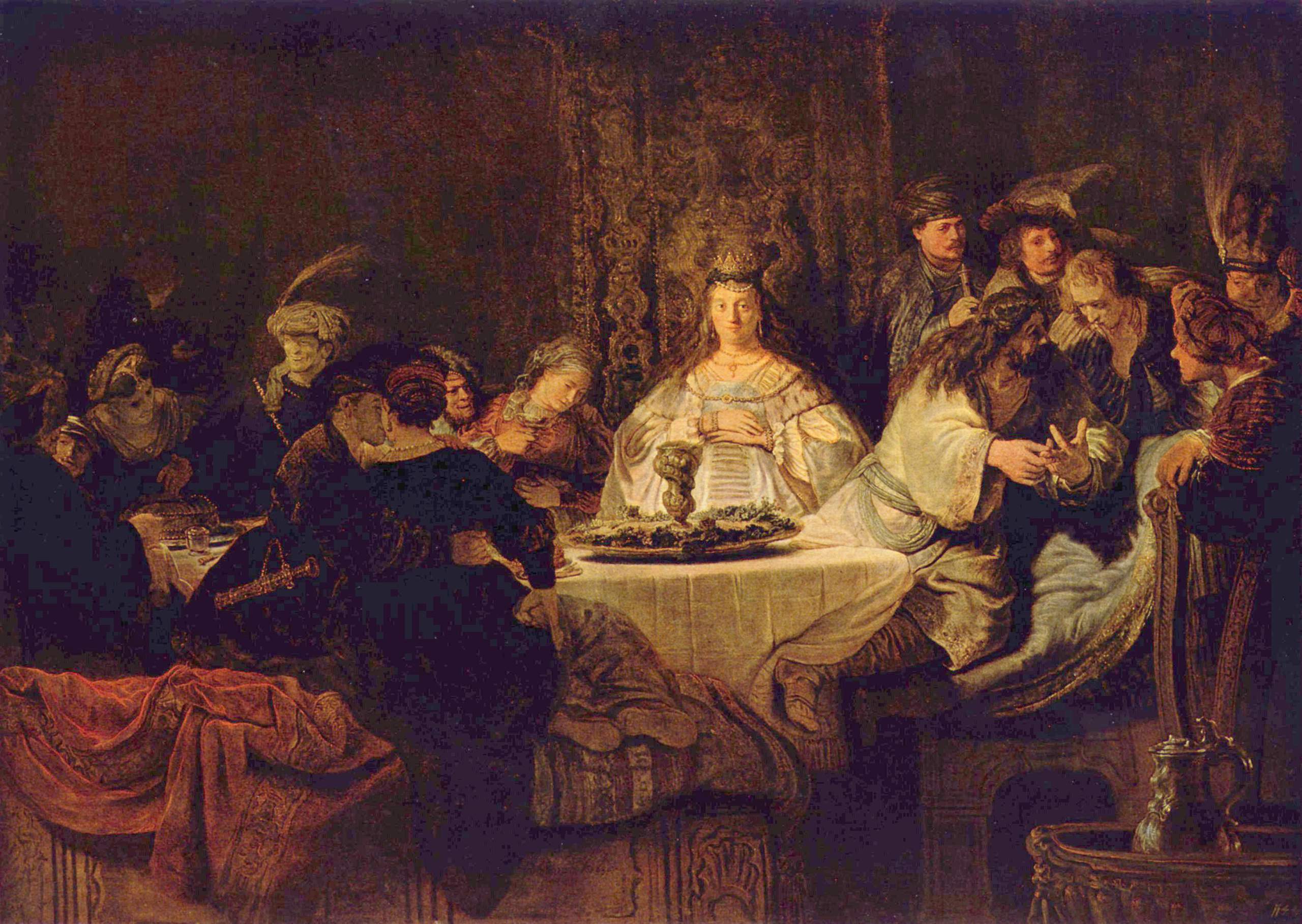|
Exeter Book Riddle 27
Exeter Book Riddle 27 (according to the numbering of the Anglo-Saxon Poetic Records) is one of the Anglo-Saxon riddles, Old English riddles found in the later tenth-century Exeter Book. The riddle is almost universally solved as 'mead'. Text As edited by Krapp and Dobbie in the Anglo-Saxon Poetic Records series, Riddle 27 runs: Ic eom weorð werum, wide funden, brungen of bearwum ond of burghleoþum, of denum ond of dunum. Dæges mec wægun feþre on lifte, feredon mid liste under hrofes hleo. Hæleð mec siþþan baþedan in dydene. Nu ic eom bindere ond swingere, sona weorpere; esne to eorþan hwilum ealdne ceorl. Sona þæt on findeð, se þe mec fehð ongean ond wið mægenþisan minre genæsteð, þæt he hrycge sceal hrusan secan, gif he unrædes ær ne geswiceð; strengo bistolen, strong on spræce, mægene binumen, nah his modes geweald, fota ne folma. Frige hwæt ic hatte, ðe on eorðan swa esnas binde dole æfter dyntum be dæges leohte. I am valuable/useful to men, fo ... [...More Info...] [...Related Items...] OR: [Wikipedia] [Google] [Baidu] |
Anglo-Saxon Poetic Records
The Anglo-Saxon Poetic Records (ASPR) is a six-volume edition intended at the time of its publication to encompass all known Old English poetry. Despite many subsequent editions of individual poems or collections, it has remained the standard reference work for scholarship in this field. History The edition was conceived by George Philip Krapp (1872–1934), who edited volumes 1, 2, and 5 while Professor of English at Columbia University, with the assistance of his student and colleague Elliott Van Kirk Dobbie. Krapp died partway through editing volume 3, and Dobbie completed this edition before going on to complete the series by editing volumes 6 (which came out in 1942) and 4 (which emerged in 1953).. According to Henry Wiggins, the long gap before the publication of Volume 4 was partly due to Elliott's feeling that there was no urgency about completing the ''Beowulf'' volume, because there were so many competent editions. The Press, like any publisher, was troubled about the abs ... [...More Info...] [...Related Items...] OR: [Wikipedia] [Google] [Baidu] |
Anglo-Saxon Riddles
Anglo-Saxon riddles are a significant genre of Anglo-Saxon literature. The riddle was a major, prestigious literary form in early medieval England, and riddles were written both in Latin and Old English verse. The pre-eminent composer of Latin riddles in early medieval England was Aldhelm (d. 709), while the Old English verse riddles found in the tenth-century Exeter Book include some of the most famous Old English poems. History Antique inspirations Riddles are an internationally widespread feature of oral literatures and scholars have not doubted that they were traditional to Old English culture. But the history of riddles as a literary genre in England seems to be rooted in an influential collection of late Antique Latin riddles, possibly from north Africa, attributed to a poet called Symphosius, whose work English scholars emulated and adapted. Aldhelm As the conversion of England to Christianity proceeded during the seventh century, Old English-speakers studied Latin ... [...More Info...] [...Related Items...] OR: [Wikipedia] [Google] [Baidu] |
Exeter Book
The Exeter Book, also known as the Codex Exoniensis or Exeter Cathedral Library MS 3501, is a large codex of Old English poetry, believed to have been produced in the late tenth century AD. It is one of the four major manuscripts of Old English poetry, along with the Vercelli Book in Vercelli, Italy, the Nowell Codex in the British Library, and the Junius manuscript in the Bodleian Library in Oxford. The book was donated to what is now the Exeter Cathedral library by Leofric, the first bishop of Exeter, in 1072. It is believed originally to have contained 130 or 131 leaves, of which the first 7 or 8 have been replaced with other leaves; the original first 8 leaves are lost. The Exeter Book is the largest and perhaps oldest known manuscript of Old English literature, containing about a sixth of the Old English poetry that has come down to us. In 2016, UNESCO recognized the book as "the foundation volume of English literature, one of the world's principal cultural artefa ... [...More Info...] [...Related Items...] OR: [Wikipedia] [Google] [Baidu] |
Riddles
A riddle is a statement, question or phrase having a double or veiled meaning, put forth as a puzzle to be solved. Riddles are of two types: ''enigmas'', which are problems generally expressed in metaphorical or allegorical language that require ingenuity and careful thinking for their solution, and ''conundra'', which are questions relying for their effects on punning in either the question or the answer. Archer Taylor says that "we can probably say that riddling is a universal art" and cites riddles from hundreds of different cultures including Finnish, Hungarian, American Indian, Chinese, Russian, Dutch and Filipino sources amongst many others. Many riddles and riddle-themes are internationally widespread. In the assessment of Elli Köngäs-Maranda (originally writing about Malaitian riddles, but with an insight that has been taken up more widely), whereas myths serve to encode and establish social norms, "riddles make a point of playing with conceptual boundaries and cross ... [...More Info...] [...Related Items...] OR: [Wikipedia] [Google] [Baidu] |
Old English Literature
Old English literature refers to poetry and prose written in Old English in early medieval England, from the 7th century to the decades after the Norman conquest of England, Norman Conquest of 1066, a period often termed Anglo-Saxon England. The 7th-century work ''Cædmon's Hymn'' is often considered as the oldest surviving poem in English, as it appears in an 8th-century copy of Bede's text, the ''Ecclesiastical History of the English People''. Poetry written in the mid 12th century represents some of the latest post-Norman examples of Old English. Adherence to the grammatical rules of Old English is largely inconsistent in 12th-century work, and by the 13th century the grammar and syntax of Old English had almost completely deteriorated, giving way to the much larger Middle English literature, Middle English corpus of literature. In descending order of quantity, Old English literature consists of: sermons and saints' lives; biblical translations; translated Latin works of the ... [...More Info...] [...Related Items...] OR: [Wikipedia] [Google] [Baidu] |


